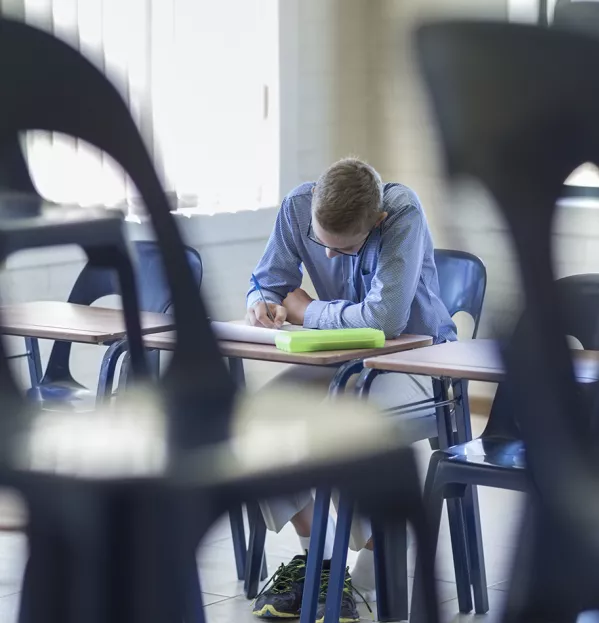- Home
- Teaching & Learning
- Secondary
- Why we turned detentions into taught sessions
Why we turned detentions into taught sessions

Thirty students sit in detention either silently staring ahead, completing homework or gazing, unseeing, at a knowledge organiser. After half an hour, they’re told they’ve served their time and may leave.
Was the detention successful? Well, everyone attended, and the teachers are confident that the students spent lunchtime being suitably chastised. The member of staff leading the detention felt a glimmer of pride that they made the most challenging students in the school sit in silence for 30 minutes.
But when it’s the same students in detention the next day, or later that week, can it still be considered a success? When students are misbehaving in the detention itself and rapidly accelerating up the sanctions system, can we still cling on to the idea that justice has been served?
Too often detentions don’t actually teach students how or why to behave but just provide them with an incentive not to get caught. That’s why, at my school, we decided to take a different approach, while maintaining a system of clear and logical consequences for unwanted behaviour.
We didn’t want to remove detentions entirely, but hoped to make them a more useful tool by changing what happened once students were in them. Our solution was to reimagine the detention into a taught session, which combined group discussion and direct instruction with chances for students to think deeply about their behaviour and how they might change it.
Here’s what we did.
Behaviour: tips for making detentions more useful
How to run a taught detention
We knew that sessions needed to focus on addressing the specific behaviours of the students in the room, so we approached this by running two detention sessions simultaneously - one to target in-lesson behaviour and truancy, and another for issues related to uniform or social time. Although not everything covered in the session will be relevant for everyone, there is something for everyone.
Very often sessions require very little planning because they are teacher-led discussions of known issues (see the box below).
It is important to state that sessions are not vehicles for apologies. Students are there because they are either unable or unwilling to meet a behaviour expectation and, to address this, they must be either taught or inspired to change. This can only happen through reflective, restorative discussion.
To make sure that staff get those discussions right, we encourage them to use scripted phrases and sentence starters. Some of the phrases we suggest are:
- “I can see how that would be frustrating, but…”
- “You’re entitled to disagree with our decision, however…”
- “…can you see how your action X led to outcome Y?”
- “…how could a different action have altered outcome Y?”
It’s easy to get drawn into a negative conversation when discussing a behaviour incident with a student, but we want to always return to the idea that we are teaching and inspiring students to change their future behaviour, not punish them for the past.
Read more:
As well as having the tools to conduct restorative conversations, the staff running the detentions also need to be confident managing a large group of high-need students in a calm, non-confrontational way. In our experience, teachers of challenging key stage 4 core classes have been most effective.
We have staffed our detentions with members of the leadership team with responsibilities for behaviour, as well as offering it as a voluntary paid duty for other members of staff with the appropriate skill sets.
Do taught detentions work?
So, how successful has this new approach been?
Well, it would be untrue to say that the change in detentions has solved all behaviour problems. We are still experiencing the same challenges as many schools across the country and we still see some of the same faces most days in detentions for the same reasons. Unexpectedly, a handful of students even seem to like being in these sessions.
Overall, however, we are positive about the impact. Returnees are on a journey of changing their behaviour, and are consequently receiving regular sessions to support them in this process.
Those who enjoy being there do so because they have formed positive relationships with the staff present, in some cases the only one they have in the school, and if this centres on teaching positive behaviour it must be beneficial.
What we have seen, though, is a change of tone in the immediate response to challenging behaviour, across the school. Staff and students now know that if a behaviour expectation is not met, there will be a timely, targeted session to address this.
It is early days and we cannot say that taught detentions solve all and every behaviour issue, but we know that our detentions are now far more useful than they were before.
Stuart Hodgson is senior behaviour lead at a secondary school in the East of England
You need a Tes subscription to read this article
Subscribe now to read this article and get other subscriber-only content:
- Unlimited access to all Tes magazine content
- Exclusive subscriber-only stories
- Award-winning email newsletters
Already a subscriber? Log in
You need a subscription to read this article
Subscribe now to read this article and get other subscriber-only content, including:
- Unlimited access to all Tes magazine content
- Exclusive subscriber-only stories
- Award-winning email newsletters
topics in this article



